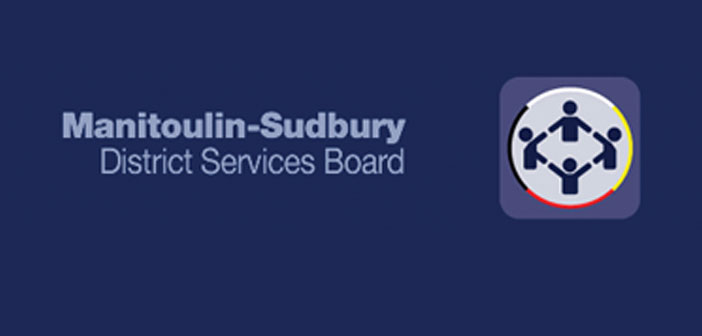by Michael Erskine
ESPANOLA—Just because the homeless are not to be found curled up in tattered blankets over a grate on the streets of Island communities does not mean they do not exist. Manitoulin-Sudbury District Services Board (DSB) members representing municipalities across Manitoulin and the North Shore have added their voices to the Association of Municipalities of Ontario’s call in its pre-budget submission for the Ford government to put an end to homelessness in the province.
“The DSB passed a resolution for AMO’s call to end homelessness,” confirmed DSB CAO Donna Stewart. “This resolution will be shared widely—AMO, NOSDA, NOMA, FONOM, other DSBs, ministries and municipalities—to support this call for action.”
“At the same time that COVID-19 created an unanticipated spike in demand for houses in Ontario, it laid bare the failure of Ontario’s public policy approach to homelessness,” notes the AMO submission. “The homelessness crisis in your community is a made-in-Ontario crisis brought about by the policy decisions and choices of successive provincial governments over the past three decades. Inadequate investment in the health and mental health systems, and outdated approaches to addictions have failed people and families.”
The AMO went on to note that, “provincial policies on financial assistance contribute substantially to growing income disparity and poverty. Failures in provincial child welfare, social services, justice and corrections systems compound barriers to economic participation and contribute directly to homelessness.”
AMO went further in placing the responsibility for the homelessness crisis squarely at the feet of the provincial government. “The downloading of social housing and homelessness to municipalities in the 1990s hides the fact that our homelessness crisis is a product of provincial choices and policy levers entirely within the provincial sphere of authority, financial responsibility and accountability,” reads the submission.
AMO pointed out that Ontario’s homelessness crisis “harms people and families and undermines the social fabric and economic prospects of our communities. It imposes unnecessary costs on our institutions, community agencies and government.”
The submission goes on to note that “the Government of Ontario has the tools and resources to end the homelessness crisis it has created over decades. It must surely possess the leadership, capability and political will to get the job done. AMO is calling on the Government of Ontario to take integrated and collaborative action to end homelessness in Ontario. Municipalities and partners in all social and economic sectors stand ready to assist with the task.”
“On the DSB front, we are required to maintain a by-name-list (BNL) to ensure that the homeless individuals identified are provided with wrap around supports,” said Ms. Stewart. “We also have created a ‘Change Team’ which consists of over 20-plus providers and they meet regularly to help ensure that the work is seamless when the individual is identified and requires supports.”
Ms. Stewart explained that a BNL “is a real-time list of all known people experiencing homelessness at a given point in time. The BNL is designed as a tool for communities to support triage to services, system performance evaluation and advocacy.”
For the purposes of a BNL, continued Ms. Stewart, “homelessness describes the situation of an individual or family with the absence of stable, safe, permanent, appropriate housing or the immediate means and ability to acquire it. This can include unsheltered, emergency sheltered or provisionally accommodated (hospital, jail, residential treatment).”
Further a BNL provides aggregate data for service managers and community partners to identify the needs of individuals, gaps in community services and advocate for what resources are needed to end homelessness.
“The Manitoulin-Sudbury DSB has developed a BNL and a ‘Change Team’ built of representatives from community agencies with a passion for system improvement and working together to end homelessness,” noted Ms. Stewart.
In addition, supporting the AMO call for action on homelessness, the DSB has updated its centralized housing waitlist policy to reflect new affordable and market rents for any new DSB acquisitions or new builds. “The housing waitlist policy will be uploaded to our website shortly.”
DSB also supported Public Health Sudbury and Districts call on the provincial government to incorporate local food affordability findings in determining adequacy of social assistance levels. “Again here, we will send our resolution to various ministries, local MPPs and to PHSD to support their ask,” said Ms. Stewart.
In previous conversations with the DSB administration, it was revealed that the DSB does not have adequate resources to tackle homelessness within the communities it serves, especially for single individuals. In essence, the sole practical approach has been to provide such individuals with the means to travel to larger urban centres with stronger resources and service bases.





